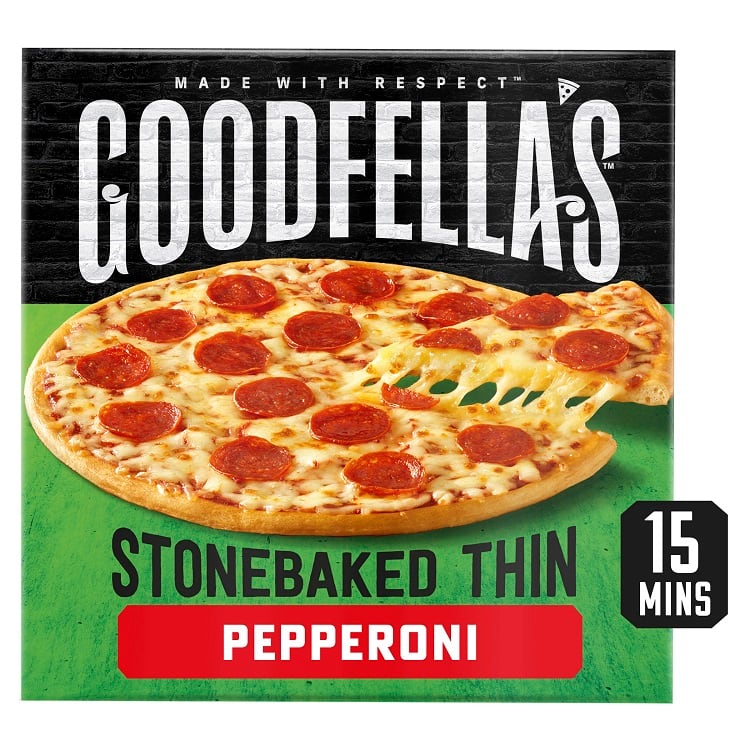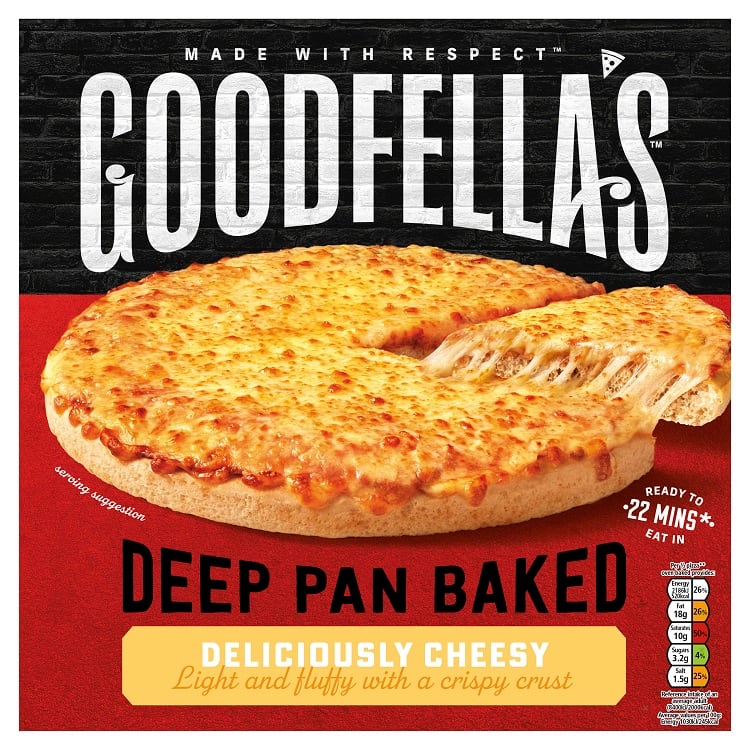Two years ago, Nomad Foods was making progress in reformulating its high fat, salt and sugar (HFSS) pizzas. But it wasn’t there yet.
Now, Europe’s largest frozen food company is announcing it’s achieved 100% HFSS compliance for its Goodfella’s pizza range.
“Our actions have demonstrated that developing non-HFSS versions of traditionally indulgent categories and products is possible,” says Nomad Foods group nutrition leader Lauren Woodley.
So how did the brand move from 85% to 100% compliance in less than 24 months?
Nomad cuts challenging-to-reformulate pizzas from portfolio
Nomad has taken a step-by-step approach to reformulation, including reevaluating if every SKU in its Goodfella’s portfolio is worth its salt.
As it so happens, not every product made the cut. Luckily for Goodfella’s, the most difficult pizzas to reformulate were also those that made the least business sense.
“Some of the most challenging pizza recipes to reformulate to non-HFSS were also the most challenging commercially,” Lauren Woodley, group nutrition leader at Nomad Foods told FoodNavigator.
“Therefore we took the decision to rebalance our portfolio to achieve 100% non-HFSS compliance.”
What does 'less healthy' or HFSS food mean?
Less healthy products high in fat, sugar or salt are described as being HFSS. The terminology is predominantly used in the UK, where the government employs a nutrient profiling model to assess the nutritional quality of food products.
In essence, the scoring system balances the contribution made by beneficial nutrients (fruit, vegetable, and nut content; fibre; and protein) with components in food people should eat less of (saturated fat, sugar, sodium, and excessive calories).
In approaching the Goodfella’s non-HFSS project in stages, Nomad tackled its biggest sellers first – the idea being that those products would have the greatest beneficial impact for its consumers.
These are Goodfella’s Thin Stonebaked Cheese and Pepperoni variants. From there, Nomad moved onto the rest of its Thin Stonebaked range, its Takeaway range, its Deep Pan and Pizza Pockets range, and its Gluten-Free range.
Nomad Foods is considered Europe’s largest frozen food company, with a portfolio of brands it has acquired in recent years, including Birds Eye, Findus, Iglo, Aunt Bessie’s, La Cocinera, Ledo, Frikom, and pizza brand Goodfella’s.
“Each pizza format had its own challenges for achieving non-HFSS status,” Woodley explained.
Nomad reformulates and innovates to achieve HFSS-compliant pizzas

Reformulating to remove saturated fat, salt, and excess calories has been key to Nomad’s strategy. But nutrient reduction is only part of the story.
Innovation, whereby Nomad boosts nutrient profiles with macronutrients such as fibre and protein, was also part of the Goodfella’s strategy.
“We looked at the totality of the products,” said Woodley, “improving all elements of the pizzas from the base to the sauce to the toppings.”
Some pizzas took longer to reformulate than others, which is why two years ago Goodfella’s had achieved 85% HFSS compliance, and not yet the full 100%. Sensory testing accompanied reformulation and innovation efforts, and if the panel wasn’t on board, the ‘healthier’ pizzas wouldn’t go to market, the nutrition lead suggested.
“For the final pizza recipes reformulated, we faced a greater challenge to retain the pizza eating experience when moving to non-HFSS, hence the work on these products took a little longer.”
Why is being non-HFSS important?
Achieving HFSS compliance is important for several reasons, not least because overconsumption of less healthy HFSS food is linked to poor health outcomes.
From a commercial perspective, it matters too. In the UK, HFSS regulations are restricting the promotion of less healthy products.
The first wave of legislation saw HFSS food and drinks banned from prominent sales locations in-store and online. From October 2025, multibuy offers (including ‘buy one get one free’) will be banned. At the same time, TV advertising of HFSS food and drinks will be subjected to a 9pm watershed.
For Nomad Foods, recent reformulation efforts enables it to advertise, promote and grow its Goodfella’s range in compliance with HFSS regulations.
Nomad takes a ‘health by stealth’ approach to reformulation
Although all of Nomad’s Goodfella’s range is now non-HFSS, consumers won’t be alerted to reformulation efforts on-pack. Instead, the company is taking a ‘health by stealth’ approach.
“Reformulated pizza recipes needed to have no detectable change or impact on liking to be progressed,” recalled Woodley.
As a result, consumers would only be aware of the pizzas’ HFSS status if they were to calculate the nutrient profiling score using the on-pack nutrition and ingredient data. Nomad has taken the decision to voluntarily label fibre content across its products, which it says enables consumers to have the complete nutrition profile of its products.
Reformulation efforts don't stop at pizza...
Nomad has been reformulating across multiple brand portfolios. Today, more than 93% of its annual sales come from non-HFSS products.
One of the most challenging portfolios to reformulate belongs to its Aunt Bessie’s brand in the UK. By reducing sugar content while increasing fibre, Nomad has cut sugar content across its seven best-selling desserts between 16-22% and increased fibre by up to 50%.
Aunt Bessie’s apple crumble product, for example, has undergone renovation and is now HFSS compliant. Not that Nomad is marketing the product in that way. “We’d never tell consumers, because we’re fairly sure a lot of consumers wouldn’t buy it if they thought it was a bit too healthy and wouldn’t deliver on the apple crumble experience,” said Nomad Foods group nutrition leader Lauren Woodley.
Find out more about Nomad Foods’ reformulation efforts in desserts here: How unlikely foods hit the sweet spot with regulators
Within its now HFSS-compliant range, Nomad has also launched new pizza variants with less than 600 calories per serving. The sub-range

was formulated to deliver a ‘superior’ pizza experience within challenging calorie limits, according to the nutrition lead.
“Every element of each of our 600 calories or fewer pizzas was created to deliver a finished product that delivers the taste, eating experience and overall satisfaction that our consumers expect but within a product that provides maximum 600 calories per full pizza.”
Better for human and planetary health
Not only has Nomad moved its Goodfella’s range out of the ‘less healthy’ category, but in its recently released 2023 Sustainability Report, the company reports environmental wins for the brand.
Last year, the company’s Goodfella’s factory in Naas, Ireland, implemented solutions aimed at reducing the food waste associated with pizza production. For one, Nomad has put a process in place to capture cheese and topping losses so that they can be reused, whilst also optimising the adhesion of toppings to pizzas to reduce topping loss during packaging.
“To ensure we can capture and distribute all edible pizzas that do not meet manufacturing specifications (for example, as to size), the factory installed a small in-house cold store to the production line to avoid them being stored at incorrect temperatures,” explained Goodfella’s parent company.
There are other food waste benefits associated with the frozen food category more generally, explained Woodley. “By being frozen, [our pizzas] are afforded other benefits including locked-in nutrients and extended shelf life.
“The latter also helps consumers to reduce their in-home food waste.”




